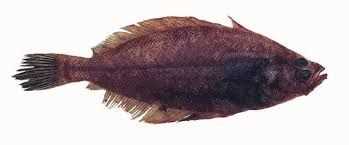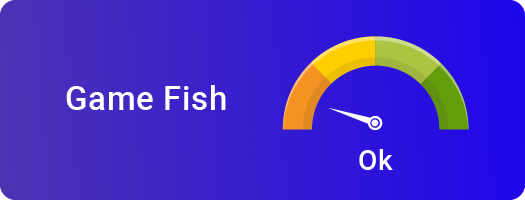Slender Sole

Species Details
Lyopsetta Exilis
Pleuronectidae
Pleuronectiformes
Offshore, Deepwater
3 - 7 lbs.
8" - 14"
Slender Sole (Lyopsetta Exilis) Fish Description
The slender sole is from the family Pleuronectidae, a group of flatfish right-eye flounders, and a bottom-dwelling fish that lies flat on its left side. It’s a marine fish distributed along the eastern North Pacific and may be found in the same waters as the English sole (Parophrys vetulus) and rock sole (Lepidopsetta bilineata).
Slender soles have long and continuous 72-78 dorsal soft rays and 57-65 anal soft rays that reach almost until its head. It has very small pectoral fins and a rounded frayed tail with scales that are easy to remove. Its mouth is relatively large and reaches back to around the middle section of its lower eye.
This fish has a thin body and is usually dark red-brown with black blemishes and dark eyes. Other specimens have been recorded as a dark pink-red with dark splotches and pale fins that have gold-green reflections.
Diet & Size
The slender sole's primary diet consists of marine worms, krill, mysids, amphipods, and shrimps. They will also feed on some smaller fish, copepods, and zooplankton. The slender sole is a small fish with an average size of about 8 inches long. Females are slightly larger with a mean length of 8.5 inches, while males are shorter at 7.5 inches. There are records of it reaching lengths of 14-17 inches.
Interesting Facts About the Slender Sole
- The slender sole is the only species in the genus Lyopsetta
- It’s highly tolerant of severe hypoxia
- It has little value as food or game fish because of its size, even though it’s flavorful
- It can host various protozoan parasites
- It suffers from hemorrhaging when caught in trawl nets
- Using LED lights on fishing lines of commercial shrimp trawlers reduces the bycatch of slender soles
Fishing Techniques
In British Columbia, Saanic Inlet is considered a hotspot for this fish at depths of 278 feet and below. In Washington State, anglers have reported success in Cormorant Passage, the Sallish Sea, and Strait of Georgia. California residents have pointed out areas between the Golden Gate Bridge and Point Reyes that can have sizable populations as well.
The best live baits for slender soles are usually worms, shrimp, strips of squid, clams, and small pieces of fish. Using line weights to help bait sink to the bottom while drift fishing along the sole’s known habitat is also effective.
The slender sole is commonly caught from March to May and June to November, with a peak during July, but may vary slightly in each area. Soles rest on the bottom, lying in wait during the day and coming closer to the shore at night. If the tides are strong, they may anchor themselves on the bottom until the currents subside. Flounder gigging will not work with this fish, as they are found in very deep waters.
A specially designed flounder or flatfish rig is the best choice, as they have three separate hooks attached to snoods that allow anglers to attach three different baits to determine the most successful one. Using a 60lb line with a size 2-6 hook and ½ to ¼ ounce line weights with beads or sequins on the snoods should help hook the slender soles.
Habitat & Distribution
The slender sole is a marine bottom-dwelling fish found commonly along the California Current, in the eastern Pacific Ocean, which extends from British Columbia to Baja California Sur. It’s bathydemersal, meaning they’re often in deep waters of 656 feet. However, their depth range can reach as deep as 2,625 feet and a shallower 82 feet.
In the North Eastern Pacific it can be found in the Alsek River and the Gulf of Alaska. There have been reports of it being present in Puget Sound (an inlet near Washington state), the Sallish Sea, and the Strait of Georgia. The fish’s range extends all the way south to Isla Cedros and central Baja California in Mexico.
In Saanich Inlet on the southeast coast of Vancouver Island, such large numbers of the slender sole have been documented at 230-278 feet deep, that clouds of sentiment on the bottom are created as they dart about and feed on zooplankton. Past 340 feet in depth, it’s the only flatfish that can be found.




